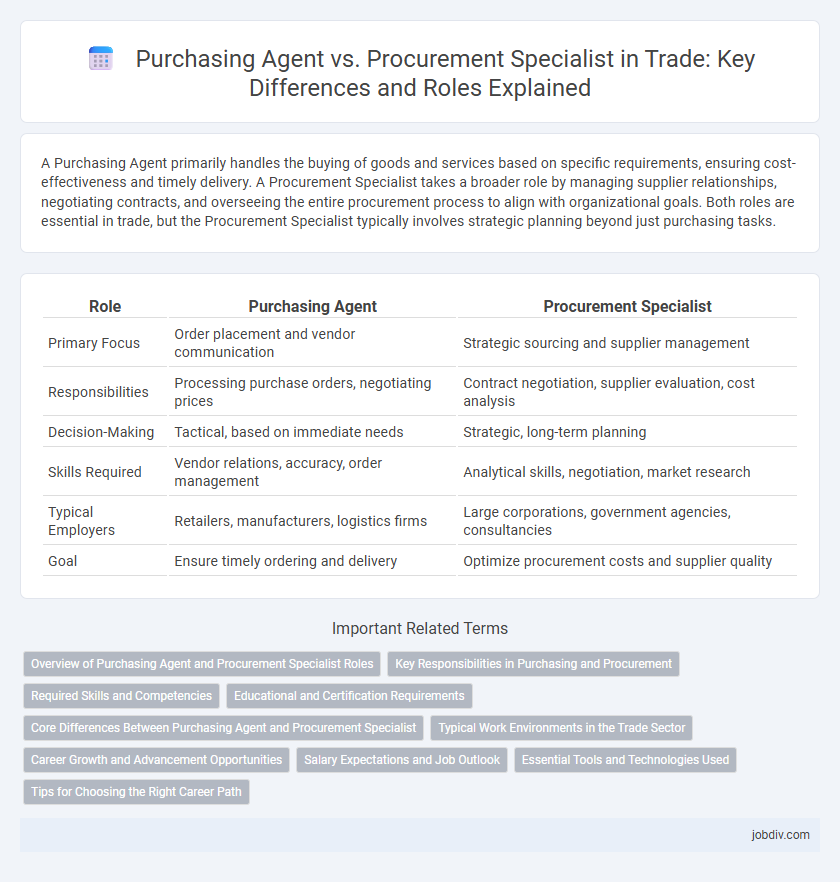A Purchasing Agent primarily handles the buying of goods and services based on specific requirements, ensuring cost-effectiveness and timely delivery. A Procurement Specialist takes a broader role by managing supplier relationships, negotiating contracts, and overseeing the entire procurement process to align with organizational goals. Both roles are essential in trade, but the Procurement Specialist typically involves strategic planning beyond just purchasing tasks.
Table of Comparison
| Role | Purchasing Agent | Procurement Specialist |
|---|---|---|
| Primary Focus | Order placement and vendor communication | Strategic sourcing and supplier management |
| Responsibilities | Processing purchase orders, negotiating prices | Contract negotiation, supplier evaluation, cost analysis |
| Decision-Making | Tactical, based on immediate needs | Strategic, long-term planning |
| Skills Required | Vendor relations, accuracy, order management | Analytical skills, negotiation, market research |
| Typical Employers | Retailers, manufacturers, logistics firms | Large corporations, government agencies, consultancies |
| Goal | Ensure timely ordering and delivery | Optimize procurement costs and supplier quality |
Overview of Purchasing Agent and Procurement Specialist Roles
Purchasing agents are responsible for acquiring goods and services by negotiating prices, terms, and contracts to meet company needs efficiently. Procurement specialists focus on strategizing sourcing methods, evaluating suppliers, and ensuring compliance with company policies and regulations. Both roles are critical in optimizing supply chain operations and managing vendor relationships within trade environments.
Key Responsibilities in Purchasing and Procurement
Purchasing agents focus on acquiring goods and services by negotiating prices, placing orders, and maintaining supplier relationships to ensure timely delivery and cost efficiency. Procurement specialists handle the broader sourcing process, including market analysis, contract management, compliance with company policies, and supplier performance evaluation to optimize supply chain operations. Both roles collaborate to balance cost control, quality standards, and inventory management within organizational purchasing strategies.
Required Skills and Competencies
Purchasing agents excel in negotiation, vendor management, and cost analysis, emphasizing transactional buying and supplier relations to secure competitive pricing. Procurement specialists possess advanced competencies in strategic sourcing, contract management, and supply chain optimization, integrating market research and risk assessment to enhance procurement efficiency. Both roles demand strong communication, analytical thinking, and knowledge of procurement software, but procurement specialists typically require deeper expertise in compliance and long-term supplier strategy.
Educational and Certification Requirements
Purchasing Agents typically require a high school diploma or associate degree, with certifications such as Certified Professional in Supply Management (CPSM) enhancing career prospects. Procurement Specialists often hold a bachelor's degree in business, supply chain management, or a related field, with advanced certifications like Certified Procurement Professional (CPP) improving expertise and job opportunities. Both roles benefit from continuous education and certifications to stay updated on industry regulations and best practices.
Core Differences Between Purchasing Agent and Procurement Specialist
Purchasing agents primarily focus on acquiring goods and services by negotiating prices and placing orders to meet company needs, whereas procurement specialists manage the entire procurement process, including supplier evaluation, contract management, and strategic sourcing. Procurement specialists often handle supplier relationships and compliance with procurement policies, ensuring alignment with organizational goals. The core difference lies in purchasing agents being transaction-oriented and procurement specialists adopting a broader, strategic role within supply chain management.
Typical Work Environments in the Trade Sector
Purchasing Agents typically work within manufacturing companies, wholesale trade, and retail sectors, often stationed in corporate offices or warehouse environments where they coordinate orders and supplier communications. Procurement Specialists are frequently employed by multinational corporations, government agencies, and large trade organizations, operating in corporate headquarters or regional offices focused on strategic sourcing and contract negotiation. Both roles require extensive interaction with suppliers, logistics teams, and financial departments to ensure efficient supply chain management in the trade industry.
Career Growth and Advancement Opportunities
Purchasing agents typically focus on acquiring goods and services efficiently, often gaining skills in negotiation and vendor management that lead to roles such as purchasing manager or supply chain coordinator. Procurement specialists have a broader scope, including strategic sourcing, supplier evaluation, and contract management, positioning them for advanced careers in procurement strategy or supply chain leadership. Career growth for procurement specialists tends to offer higher earning potential and leadership opportunities due to their involvement in organizational cost savings and risk management.
Salary Expectations and Job Outlook
Purchasing Agents typically earn an average annual salary ranging from $50,000 to $70,000, while Procurement Specialists can expect higher compensation, often between $65,000 and $85,000, reflecting their broader strategic responsibilities. The job outlook for Purchasing Agents is projected to grow at about 7% over the next decade, aligning with average industry growth, whereas Procurement Specialists are expected to see a slightly faster growth rate of around 9%, driven by increasing demand for expertise in supply chain optimization. Both roles play critical parts in trade operations, but Procurement Specialists generally command higher salaries due to their advanced skills in contract negotiation and supplier relationship management.
Essential Tools and Technologies Used
Purchasing agents and procurement specialists utilize advanced tools such as enterprise resource planning (ERP) systems, e-procurement platforms, and supplier relationship management (SRM) software to streamline purchasing processes and enhance supplier collaboration. Essential technologies include spend analysis tools, contract management software, and demand forecasting applications that enable data-driven decision-making and cost optimization. Integration of AI-powered analytics and cloud-based procurement solutions further improves operational efficiency and transparency in both purchasing and procurement functions.
Tips for Choosing the Right Career Path
Purchasing Agents primarily focus on acquiring goods and services by negotiating contracts and managing supplier relationships, while Procurement Specialists emphasize strategic sourcing and cost analysis to optimize supply chain efficiency. Assess individual strengths in negotiation skills, analytical thinking, and strategic planning to determine the best fit between these roles. Exploring certifications such as Certified Professional in Supply Management (CPSM) or Certified Purchasing Professional (CPP) can enhance career prospects in both fields.
Purchasing Agent vs Procurement Specialist Infographic

 jobdiv.com
jobdiv.com